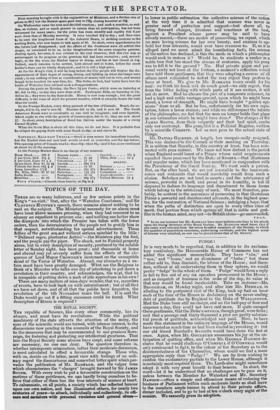FUDGE 1 IT is very much to be regretted, that,
in addition to its exclama- tory vocabulary, the Honourable House of Commons has not added this significant monosyllable. They have "ohs," and "nos," and "hears," and an abundance of "halls ;" but these rather add to, than diminish, the labour of the House ; and there- fore, without at all undervaluing them in their sphere, we would prefer "fudge" to the whole of them. "Fudge" would form a reply in full to five out of any six speeches pronounced in the House ; and as despatch of business is the order of the day, its value in that way would be found incalculable. Take an instance—Mr. BROUGHAM, on Monday night, and after him Mr. DENMAN, in alluding to the postponed visit of the King, took up half an hour- each of the time of the House in declaiming on the never-ending debt of gratitude due by England to the Duke of WELLINGTON. Had the Duke been still an ensign, and on the half-pay of four and sixpence a day, they could not have said more. It quite escaped ,.these gentlemen, that the Duke's services, though great, were finite; and that a peerage and thirty thousand a year are pretty substan- tial proofs of gratitude, acknowledged and paid. Now, to have. made this statement in the ordinary languageof the House, would have wasted as much time as had been wasted in provoking it : but our old friend Burchell's favourite would have done the feat at once. Again, when Mr. GOULBURN announces his joy at the an- ticipation of quitting office, and when Mr. GEORGE DAwsox de- clares that he would challenge O'CONNELL if O'CornvELL would: only condescend to fight, to the valour of the Secretary as to the disinterestedness of the Chancellor, where could we find a more appropriate reply than " Fudge !" We are far from wishing- to. confinethe exclamatory particle to the Lower House, although it is certainly most required there. The Lords also might sometimes adopt it with very great benefit to their hearers. In short, the word—let it be understood that no challenges are to pass on it, unless between the Member for Waterford and Mr. Secretary DAwsorr—offers a simple and efficacious means of reducing the business of Parliament within such moderate limits as shall leave to the members ample leisure to attend.b their private affairs, dinner included, and to go to bed at ten o'clock every night of the session. We earnestly press its adoption.


























 Previous page
Previous page